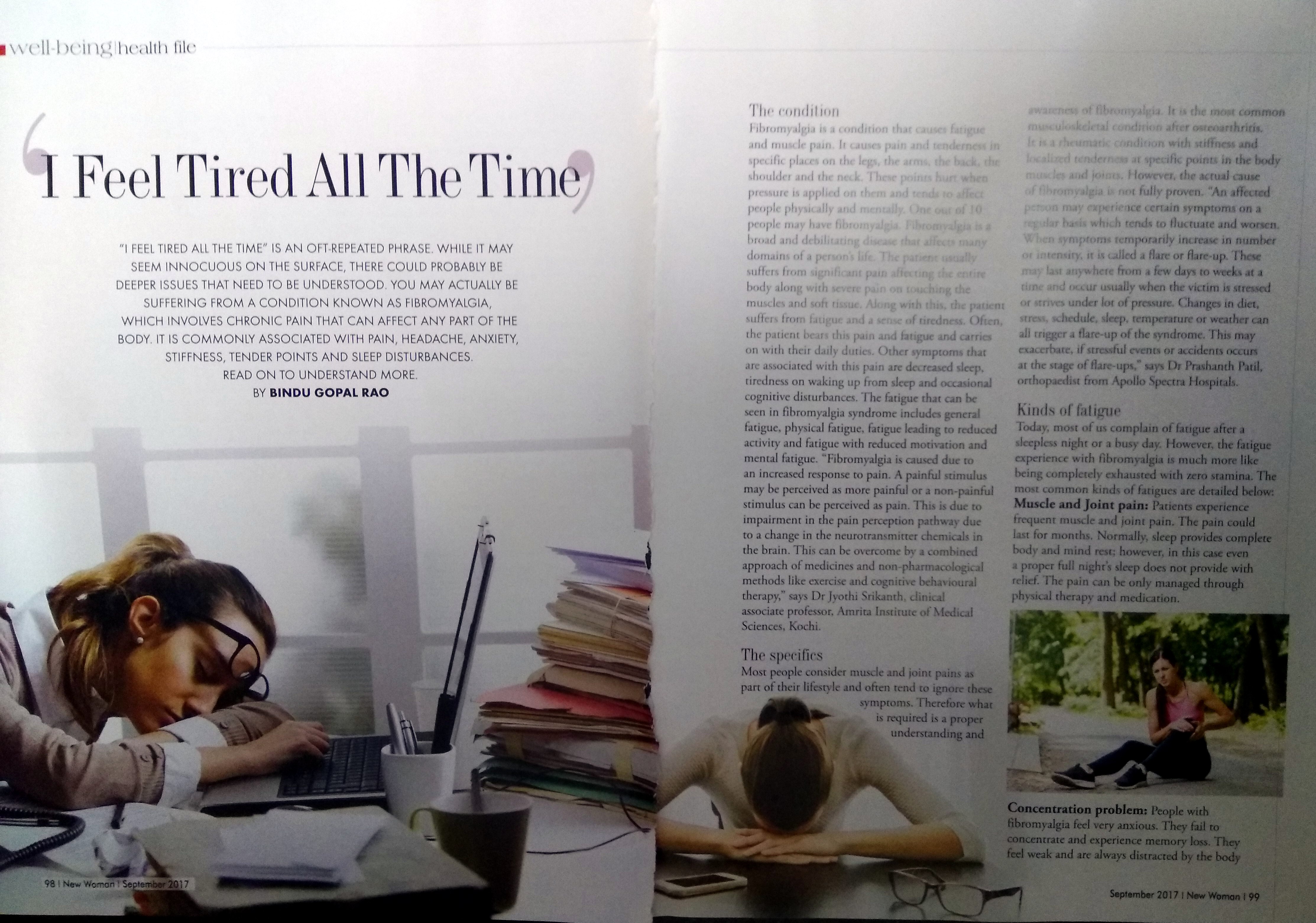“I feel tired all the time” is a phrase that is oft repeated. While it may seem quite innocuous on the surface, there probably could be a deeper issue that needs to be understood. In fact this could be a condition called fibromyalgia, a widespread pain that can affect any part of the body. It is commonly associated with pain, headache, anxiety, stiffness, tender points and sleep disturbances. So how do you help yourself? Read on to understand more.
The Condition
Fibromyalgia is a condition that causes fatigue and muscle pain. It causes pain and tenderness in specific places on legs, arms, back, shoulder and neck. These points hurt when pressure is put on them. It affects people physically and mentally. 1 out of 10 people may have fibromyalgia. Fibromyalgia is a broad and debilitating disease that affects many domains of a person’s life. The patient usually suffers from significant pain affecting the entire body along with severe pain on touching the muscles and soft tissue. Along with this, the patient suffers from fatigue and a sense of tiredness. Often the patient bears this pain and fatigue and carries on with their daily duties. Other symptoms that are associated with pain are decreased sleep, tiredness on waking up from sleep and occasional cognitive disturbances. The fatigue that can be seen in fibromyalgia syndrome includes general fatigue, physical fatigue, fatigue leading to reduced activity, fatigue with reduced motivation and mental fatigue. “Fibromyalgia is caused due to an increased response to pain. A painful stimulus may be perceived as more painful or a non-painful stimulus can be perceived as pain. This is due impairment in the pain perception pathway due to a change in the neurotransmitter chemicals in the brain. This can be overcome by a combined approach of medicines and non-pharmacological methods like exercise and cognitive behavioural therapy,” says Dr Jyothi Srikanth, Clinical Associate Professor, Amrita Institute of Medical Sciences, Kochi.
The Specifics
Most people consider muscle and joint pains as part of their lifestyle and often tend to ignore these symptoms. Therefore what is required is a proper understanding and awareness on fibromyalgia. It is the most common musculoskeletal condition after osteoarthritis. It is a rheumatic condition with stiffness and localized tenderness at specific points in the body muscles and joints. However the actual cause for fibromyalgia is not fully proven. “An affected person may experience certain symptoms on a regular basis which tends to fluctuate and worsen. When symptoms temporarily increase in number or intensity, it is called a flare or flare-up. These may last anywhere from a few days to weeks at a time and occur usually when the victim is stressed or strives under lot of pressure. Changes in diet, stress, schedule, sleep, temperature or weather can all trigger a flare-up of the syndrome. This may exacerbate, if stressful events or accidents occurs at the stage of flare-ups,” says Dr. Prashanth Patil – Orthopedist, Apollo Spectra Hospitals.
Kinds of Fatigue
Today, most of us complain of fatigue after a sleepless night or a busy day. However, the fatigue experience with fibromyalgia is much more like being completely exhausted with zero stamina. The most common kinds of fatigues are detailed below:
Muscle and Joint pain
Patients experience frequent muscle and joint pain. The pain could last for months. Normally sleep provides complete body and mind rest, however, in this case even a proper full night sleep does not provides any relief. The pain can be only managed through physical therapy and medication.
Concentration problem
People with fibromyalgia feel very anxious. They fail to concentrate and experience memory loss. They feel weak and are always distracted by the body pain and uneasiness they are going through. Therefore, the productivity at workplace is very low.
Sleep Disturbance
People suffering with fibromyalgia experience difficulty in sleeping. They might wake up several times during the night or may be lying awake for hours. In most of the cases, doctors recommend sleeping pills for the patients to make them sleep well.
Fibrofog
People with fibromyalgia also experiences fibrofog, because of the pain and suffering they experience due to fatigue, it tends to affect them mentally as well. They go through a number of mental disturbances. Fibrofog is a condition in which an individual has difficulty finding words, holding conversations, feeling alert and remembering things.
Depression
Fibromyalgia causes a high level of mental stress. The frequent chronic pain and constant state of fatigue causes chemical imbalance in the mind that might also lead to anxiety and feelings of social isolation. This sometimes also results in limited activity and sometimes no activity at all. To address the problem of depression due to fibromyalgia, the person should seek mental help from a psychiatrist and also the people around the patient can help him to come out of depression.
Take Care
Fibromyalgia affects more women than men. Women of the age group 25-60 are the main victims of this syndrome and statistics reveal that this is 10 times more than the number of affected men. “It takes a lot of time to diagnose Fibromyalgia as the disease if often confused with chronic pain. Also, many times people misunderstood it for malingering, but it is a severe medical condition that needs immediate medical help. It is believed that fibromyalgia is a women oriented disease, however, men also suffer through this condition. While there is no possible treatment for Fibromyalgia, it can be cured by making changes in your lifestyle,” says Dr PC Jagadeesh- Consultant, Arthroscopy & Sports Medicine Fortis Hospital, Bannerghatta Road. The intensity of these illness depends on the weather and time of the day- morning, late afternoon, or evening tend to be the worst times. One could put fibromyalgia completely at bay by following healthier lifestyle, taking adequate sleep, regular exercise and relaxation. Dr. Chethan Nagraj, Senior Consultant Orthopaedic Surgeon, Vikram Hospital Bengaluru, a specialist in Joint Replacement & Arthroscopy says, “De stress yourself, make lifestyle changes, do regular exercises, have hot fomentation of a warm water bath or hydrotherapy, avoid caffeine and smoking and have adequate sleep. If these are not helping, consult your doctor who may be able to help you by ruling out other serious problems, starting you on medications and with physiotherapy.” Meanwhile, if you have noticed any of the above mentioned symptoms, you should consult a doctor to develop a better understanding about the chances of being affected with fibromyalgia and receive guidance for quick recovery. “Only after proper diagnosis, the doctors can advise the next steps which could be one or any of the following- Acupuncture, TENS massage and heat therapy helps which is proven to help majority of the affected population,” says Dr. Patil.
This story appeared in New Woman’s Sep-2017 issue here:



Heard this term for the first time… Good deal of information. Thanks.
Thanks Shrinidhi. Indeed it is a complex term and this story had me find out all about it so it was good. 🙂